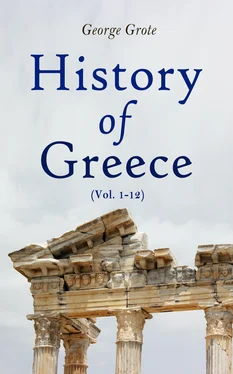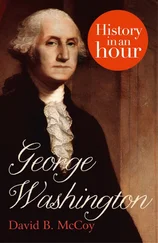George Grote - History of Greece (Vol. 1-12)
Здесь есть возможность читать онлайн «George Grote - History of Greece (Vol. 1-12)» — ознакомительный отрывок электронной книги совершенно бесплатно, а после прочтения отрывка купить полную версию. В некоторых случаях можно слушать аудио, скачать через торрент в формате fb2 и присутствует краткое содержание. Жанр: unrecognised, на английском языке. Описание произведения, (предисловие) а так же отзывы посетителей доступны на портале библиотеки ЛибКат.
- Название:History of Greece (Vol. 1-12)
- Автор:
- Жанр:
- Год:неизвестен
- ISBN:нет данных
- Рейтинг книги:5 / 5. Голосов: 1
-
Избранное:Добавить в избранное
- Отзывы:
-
Ваша оценка:
- 100
- 1
- 2
- 3
- 4
- 5
History of Greece (Vol. 1-12): краткое содержание, описание и аннотация
Предлагаем к чтению аннотацию, описание, краткое содержание или предисловие (зависит от того, что написал сам автор книги «History of Greece (Vol. 1-12)»). Если вы не нашли необходимую информацию о книге — напишите в комментариях, мы постараемся отыскать её.
History of Greece (Vol. 1-12) — читать онлайн ознакомительный отрывок
Ниже представлен текст книги, разбитый по страницам. Система сохранения места последней прочитанной страницы, позволяет с удобством читать онлайн бесплатно книгу «History of Greece (Vol. 1-12)», без необходимости каждый раз заново искать на чём Вы остановились. Поставьте закладку, и сможете в любой момент перейти на страницу, на которой закончили чтение.
Интервал:
Закладка:
But though the Hesiodic theogony passed as orthodox among the later Pagans, 23because it stood before them as the only system anciently set forth and easily accessible, it was evidently not the only system received at the date of the poem itself. Homer knows nothing of Uranos, in the sense of an arch-God anterior to Kronos. Uranos and Gæa, like Oceanus, Têthys and Nyx, are with him great and venerable Gods, but neither the one nor the other present the character of predecessors of Kronos and Zeus. 24The Cyclôpes, whom Hesiod ranks as sons of Uranos and fabricators of thunder, are in Homer neither one nor the other; they are not noticed in the Iliad at all, and in the Odyssey they are gross gigantic shepherds and cannibals, having nothing in common with the Hesiodic Cyclops except the one round central eye. 25Of the three Centimanes enumerated by Hesiod, Briareus only is mentioned in Homer, and to all appearance, not as the son of Uranos, but as the son of Poseidôn; not as aiding Zeus in his combat against the Titans, but as rescuing him at a critical moment from a conspiracy formed against him by Hêrê, Poseidôn and Athênê. 26Not only is the Hesiodic Uranos (with the Uranids) omitted in Homer, but the relations between Zeus and Kronos are also presented in a very different light. No mention is made of Kronos swallowing his young children: on the contrary, Zeus is the eldest of the three brothers instead of the youngest, and the children of Kronos live with him and Rhea: there the stolen intercourse between Zeus and Hêrê first takes place without the knowledge of their parents. 27When Zeus puts Kronos down into Tartarus, Rhea consigns her daughter Hêrê to the care of Oceanus: no notice do we find of any terrific battle with the Titans as accompanying that event. Kronos, Iapetos, and the remaining Titans are down in Tartarus, in the lowest depths under the earth, far removed from the genial rays of Hêlios; but they are still powerful and venerable, and Hypnos makes Hêrê swear an oath in their name, as the most inviolable that he can think of. 28
In Homer, then, we find nothing beyond the simple fact that Zeus thrust his father Kronos together with the remaining Titans into Tartarus; an event to which he affords us a tolerable parallel in certain occurrences even under the presidency of Zeus himself. For the other gods make more than one rebellious attempt against Zeus, and are only put down, partly by his unparalleled strength, partly by the presence of his ally the Centimane Briareus. Kronos, like Laërtes or Pêleus, has become old, and has been supplanted by a force vastly superior to his own. The Homeric epic treats Zeus as present, and, like all the interesting heroic characters, a father must be assigned to him: that father has once been the chief of the Titans, but has been superseded and put down into Tartarus along with the latter, so soon as Zeus and the superior breed of the Olympic gods acquired their full development.
That antithesis between Zeus and Kronos—between the Olympic gods and the Titans—which Homer has thus briefly brought to view, Hesiod has amplified into a theogony, with many things new, and some things contradictory to his predecessor; while Eumêlus or Arktinus in the poem called Titanomachia (now lost) also adopted it as their special subject. 29As Stasinus, Arktinus, Leschês, and others, enlarged the Legend of Troy by composing poems relating to a supposed time anterior to the commencement, or subsequent to the termination of the Iliad,—as other poets recounted adventures of Odysseus subsequent to his landing in Ithaka,—so Hesiod enlarged and systematized, at the same time that he corrupted, the skeleton theogony which we find briefly indicated in Homer. There is violence and rudeness in the Homeric gods, but the great genius of Grecian epic is no way accountable for the stories of Uranos and Kronos,—the standing reproach against Pagan legendary narrative.
How far these stories are the invention of Hesiod himself is impossible to determine. 30They bring us down to a cast of fancy more coarse and indelicate than the Homeric, and more nearly resembling some of the Holy Chapters (ἱεροὶ λόγοι) of the more recent mysteries, such (for example) as the tale of Dionysos Zagreus. There is evidence in the Theogony itself that the author was acquainted with local legends current both at Krête and at Delphi; for he mentions both the mountain-cave in Krête wherein the new-born Zeus was hidden, and the stone near the Delphian temple—the identical stone which Kronos had swallowed—“placed by Zeus himself as a sign and wonder to mortal men.” Both these two monuments, which the poet expressly refers to, and had probably seen, imply a whole train of accessory and explanatory local legends—current probably among the priests of Krête and Delphi, between which places, in ancient times, there was an intimate religious connection. And we may trace further in the poem,—that which would be the natural feeling of Krêtan worshippers of Zeus,—an effort to make out that Zeus was justified in his aggression on Kronos, by the conduct of Kronos himself both towards his father and towards his children: the treatment of Kronos by Zeus appears in Hesiod as the retribution foretold and threatened by the mutilated Uranos against the son who had outraged him. In fact the relations of Uranos and Gæa are in almost all their particulars a mere copy and duplication of those between Kronos and Rhea, differing only in the mode whereby the final catastrophe is brought about. Now castration was a practice thoroughly abhorrent both to the feelings and to the customs of Greece; 31but it was seen with melancholy frequency in the domestic life as well as in the religious worship of Phrygia and other parts of Asia, and it even became the special qualification of a priest of the Great Mother Cybelê, 32as well as of the Ephesian Artemis. The employment of the sickle ascribed to Kronos seems to be the product of an imagination familiar with the Asiatic worship and legends, which were connected with and partially resembled the Krêtan. 33And this deduction becomes the more probable when we connect it with the first genesis of iron, which Hesiod mentions to have been produced for the express purpose of fabricating the fatal sickle; for metallurgy finds a place in the early legends both of the Trojan and of the Krêtan Ida, and the three Idæan Dactyls, the legendary inventors of it, are assigned sometimes to one and sometimes to the other. 34
As Hesiod had extended the Homeric series of gods by prefixing the dynasty of Uranos to that of Kronos, so the Orphic theogony lengthened it still further. 35First came Chronos, or Time, as a person, after him Æthêr and Chaos, out of whom Chronos produced the vast mundane egg. Hence emerged in process of time the first-born god Phanês, or Mêtis, or Hêrikapæos, a person of double sex, who first generated the Kosmos, or mundane system, and who carried within him the seed of the gods. He gave birth to Nyx, by whom he begat Uranos and Gæa; as well as to Hêlios and Selêne. 36
From Uranos and Gæa sprang the three Mœræ, or Fates, the three Centimanes and the three Cyclôpes: these latter were cast by Uranos into Tartarus, under the foreboding that they would rob him of his dominion. In revenge for this maltreatment of her sons, Gæa produced of herself the fourteen Titans, seven male and seven female: the former were Kœos, Krios, Phorkys, Kronos, Oceanus, Hyperiôn and Iapetos; the latter were Themis, Têthys, Mnêmosynê, Theia, Diônê, Phœbê and Rhea. 37They received the name of Titans because they avenged upon Uranos the expulsion of their elder brothers. Six of the Titans, headed by Kronos the most powerful of them all, conspiring against Uranos, castrated and dethroned him: Oceanus alone stood aloof and took no part in the aggression. Kronos assumed the government and fixed his seat on Olympos; while Oceanus remained apart, master of his own divine stream. 38The reign of Kronos was a period of tranquillity and happiness, as well as of extraordinary longevity and vigor.
Читать дальшеИнтервал:
Закладка:
Похожие книги на «History of Greece (Vol. 1-12)»
Представляем Вашему вниманию похожие книги на «History of Greece (Vol. 1-12)» списком для выбора. Мы отобрали схожую по названию и смыслу литературу в надежде предоставить читателям больше вариантов отыскать новые, интересные, ещё непрочитанные произведения.
Обсуждение, отзывы о книге «History of Greece (Vol. 1-12)» и просто собственные мнения читателей. Оставьте ваши комментарии, напишите, что Вы думаете о произведении, его смысле или главных героях. Укажите что конкретно понравилось, а что нет, и почему Вы так считаете.












